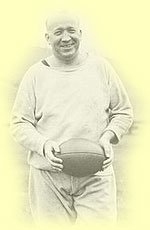This was the first of many games wich contributed to the nickname he had to "live up to"; Johnny "One Play OŽBrien".
Again in the Carnegie Tech game a week later, "One Play OŽBrien", came into the game to catch his pass. He caught it but was downed with the goal two yards away. There were no paticular heroics about this pass, Notre Dame, still fighting against odds, was hoplessly beaten.
The best Carnegie Tech team that Notre Dame ever encountered was making football history that day, winning 27-7 in a game that marked the first defeat of a Notre Dame team on Cartier Field in almost a quarter of a century. However, the fact that OŽBrien caught his pass when the Tartans were breaking up almost everything else that Notre Dame tried, seems pertinent to his history.
It was not until the contest with Nothwestern that Rockne realized that OŽBrien had something else that was vital in football; defensive qualities. In that game, or the part he played in it, OŽBrien played splendid defensive football and was one of the interferers that swept Wildcats out of the way while Marchmont Schwartz tore across for the touchdown that was so long awaited. OŽBrien, found at last to be something more than a one-play man, was in the starting lineup against Southern California in the game that closed his career - and RockneŽs - insofar as intercollegiate composition was conserned. The game he turned in, offensively, and defensively, was close to perfection itself. On the day he became "All Plays OŽBrien" and was told as much, later on, when Rockne took himself to task for going through all the games since 1928 regarding OŽBrien chiefly as the man who had caught a pass that beat Army.
OŽBrien was a member of the Notre Dame squad in both 1929 and 1930, in neither of those seasons was a defeat registered against Notre Dame, and in no contest was the need for OŽBrien peculiar talents needed. As the 1930 season was drawing to a close, it seemed, that OŽBrien might close his career at Notre Dame with two great memories:
One of the pass he caught that beat the Army in 1928 and the other - certainly one to be treasured - that he was the only Notre Dame player in the schools history who was ever embraced by Rockne upon leaving a game. This was of course after the Army game in 1928. Johnny OŽBrien died in a car accident.
Charles E. "Gus" Dorais:
 |
played quarterback for Notre Dame from 1911-1913.
"Gus" Dorais was born 2nd of July 1891 in Chippewa Falls, WI. The 5-foot-7, 145-pound Dorais was a fast, elusive runner and dangerous kick returner as well as an accurate passer. During his three years as a starter at Notre Dame, the school won 20 games and tied 2 without a loss. |
Dorais led Notre Dame to three consecutive undefeated seasons.
In the summer of 1913, Dorais and his Notre Dame teammate Knute Rockne worked at the Cedar Point Resort in Sandusky, OH. During their free time, they practiced passing on the beach with Dorais, a quarterback, throwing to Rockne, an end. Rockne later wrote, "We mastered the technique of catching the football with hands relaxed and tried to master the more difficult feat of catching it with one hand."
Duo of Dorais to Rockne is credited with making the forward pass popular after the 1913 Army upset. First recorded pass to Rockne was in 1911 win vs. Ohio Northern.
After outscoring its first three opponents 169 to 7, Notre Dame traveled to West Point to face a heavily favored Army team. Dorais completed his first 12 passes, 3 of them for touchdowns, in a 35-13 victory. The win established Notre Dame as a genuine football power for the first time, and it also alerted other teams to the possibility of using the pass as a basic offensive weapon.
Only four-year starter at quarterback for Notre Dame for 70 years until Blair Kiel was it in 1980.
Dorais played for several professional teams, including the Massillon Tigers, before the NFL was organized. He coached at Columbus (now Loras) College in Iowa from 1914 through 1917, at Gonzaga University from 1920 through 1924, and at Detroit University from 1925 through 1942. His overall record was 150 wins, 70 losses, and 13 ties. He had a 20-31-2 record with the NFLŽs Detroit Lions from 1943 through 1947.
Dorais still holds the all-time Notre Dame individual record for most field goals attempted in a single game with seven (making three) vs. Texas in 1913.
Charles E. "Gus" Dorais died 3rd of January 1954.

